-
Target Test Prep's 2024 GMAT Focus Edition prep is discounted for the BTG community!
Redeem
Face Off: Kellogg vs. Ross
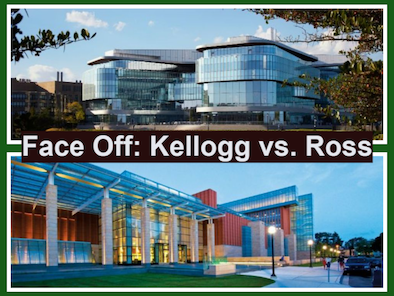
The school selection process for MBA applicants can seem daunting. With so many highly ranked business schools, how can you decide which one is right for you? Today, SBC introduces a new blog series called Face Off. Here, we'll tease out the strengths and differences between two similarly ranked b-schools and explore their admissions processes. First up: the Kellogg MBA application versus the Ross MBA application.
How do the admissions requirements and selectivity compare between the pair?
Kellogg wants sparkly, dynamic people, says a former Kellogg Admissions Officer at SBC. In the Kellogg MBA application process, there's also a significant focus on academic rigor and GMAT average in the two year full-time program." For the class entering in 2018, Kelloggs GMAT average of 732 was number 2 behind Stanford.
The Kellogg MBA application entails video essays that show how a candidate can think on their feet. Icebreaker questions in the past have included "What would you do with an extra hour every day?" or What celebrity would you most want to go to Starbucks with?
These nuances allow the Kellogg MBA application to screen for personality through an "elevator pitch" ability. Kellogg wants candidates to show strong interview skills and authentic excitement about Kellogg program specifics via its novel application format.
In its application, Rosss essay prompts are traditional (not video-based) but entail more flexibility than Kellogg.
One of the things we heard from applicants was that they loved having the option to choose which essay prompt to respond to. So were keeping that feature but providing two options per short answer group rather than three, Admissions Director Soojin Kwon explained last season on her blog. We kept the ones that seemed to provide the best platform for sharing something meaningful and unique about yourselves.
Ultimately, both schools want to know what you'll contribute to the learning environment
Like Kellogg, Ross also looks for candidates who truly understand the program values. They hope to meet applicants who want to be there, and who demonstrate how they intend to contribute to the learning and extracurricular environment.
The Kellogg MBA application process includes an interview for the vast majority applicants, and it is a traditional 1:1 interview. However, Ross is more selective about interview invitations than Kellogg. Ross offers a group interview process with its Michigan Team Based Exercise "Interview." This exercise is designed to assess team dynamics and communication styles.
Northwestern's Kellogg School of Management and the Michigan Ross School of Business have similar program strengths. Plus, they attract similar recruiters and are both highly ranked. What key differences between the two schools should an MBA applicant consider?
Both programs seek well-rounded candidates with strong academic attributes and depth of character. Likewise, both programs boast a very team-focused culture and environment. A former Ross Admissions Officer on the SBC team says that Ross focuses on leadership, teamwork, intellectual aptitude, and creativity, in its admissions process.
Kelloggs focus is similar. Kellogg is looking for leadership, strong academic record and a track record of involvement, explains a former Kellogg Admissions Officer on our consulting team. Still, within these general categories, Kellogg is more selective on most application criteria---GMAT/GRE, GPA, work experience, community leadership, etc---relative to Ross.
The key difference between the programs is reputation. Kellogg consistently ranks in the top 5 of MBA programs in the US. Most rankings place Ross between 10 and 20 range. Higher brand value for Kellogg typically correlates with more robust alumni networks and student peer groups.
Given the choice between two disparate ranked programs, the majority of our past clients turn down the lower ranked program for a better brand, Stacy Blackman says.
A tough decision to make
In one instance this past season, a client took several weeks to decide between a full ride scholarship to Ross versus a no scholarship offer to Kellogg. The client was initially quite torn. She felt that both programs would open the same doors upon graduation, given that employment reports show nearly identical data points.
Not being $200k in debt, through the Ross scholarship, was very tempting for this client. After attending the admit events for both programs and extensive diligence, this client decided on Kellogg. She felt that Kellogg, with its stronger reputation, would afford an edge throughout short and long-term career changes in her future.
Next up: How do the two schools locations compare? What impact will this have on the student experience and/or job opportunities?
Both locations, Ann Arbor, Mich., and Evanston, Ill., are appealing and vibrant college towns. Evanston is adjacent to Chicago, which is a U.S. mecca of urban life and cultural experiences. That urban proximity gives the advantage to Kellogg, even with its cold winters. Ann Arbors proximate city of Detroit isnt the finest urban experience the US has to offer.
Now then, how do the two schools MBA cohorts compare in terms of quality and culture?
Michigan Rosss full time MBA program class of 2020 is slightly smaller at 423, versus Kelloggs 478. Kellogg has a higher percentage of both woman (46%) and internationals (34%), relative to Ross which is at woman (43%) and international (32%) representation. Kellogg has an advantage with respect to diverse perspectives, although both programs are known for their collaborative culture.
How do the two curriculums and teaching methods compare?
Historically, Kellogg has been stereotyped as a marketing program. In reality, by function and industry, Kelloggs outplacement into marketing is almost identical to that of Ross. Marketing has become less of a hot area for Kellogg in recent years, overshadowed by other specialty areas.
Noteworthy for Kellogg is that it has diverse tracks and specialized programs. Data Analytics, Tech, Entrepreneurship are all hot at Kellogg. With a smaller cohort of 60 students, Kelloggs MMM curriculum is a dual-degree combination of MBA and Master of Design Innovation. It has attracted strong appeal to consultants and people oriented towards design-thinking.
The 1 year (1Y) program at Kellogg class is growing in enrollment. This could be an excellent option for applicants with a softer GMAT who have already completed a few undergrad business classes.
"If an applicant wants to stay in same field, and doesnt need an internship, Kellogg 1Y could be a good option for a top tier program, says a former Kellogg Admissions Officer at SBC. Additional specialized tracks at Kellogg include:
- Real Estate
- Healthcare
- Energy
- Traditional Marketing/CPG less popular in recent seasons
- Data analysis very popular as is entrepreneurship/tech
Ross offers a personalized experience through its specialized electives for second year students. Social enterprise, emerging markets, entrepreneurial management, environmentally sustainable business are among the courses offered.
Aside from range of specialized programs, the teaching methods at both programs are a mix of experiential learning, case studies, lectures, etc. But, teamwork goes deeper at Kellogg.
Part of what makes Kellogg different, says former dean Sally Blount, is what is underneath the words team and collaborative. Its about making everyone in the room more productive. We get ahead in the world by having everyone win, not by eating someones lunch.
How do the career outcomes between the schools stack up?
The breakdown is almost identical in industries including consulting, tech, and financial services. Consumer products had a slight advantage at Kellogg, with 12% placement relative to 9% at Ross, in the 2017 employment reports (see graphics).
Ross by Industry
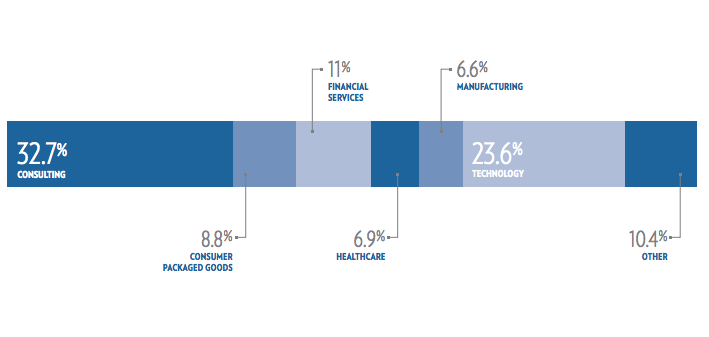
Kellogg by Industry
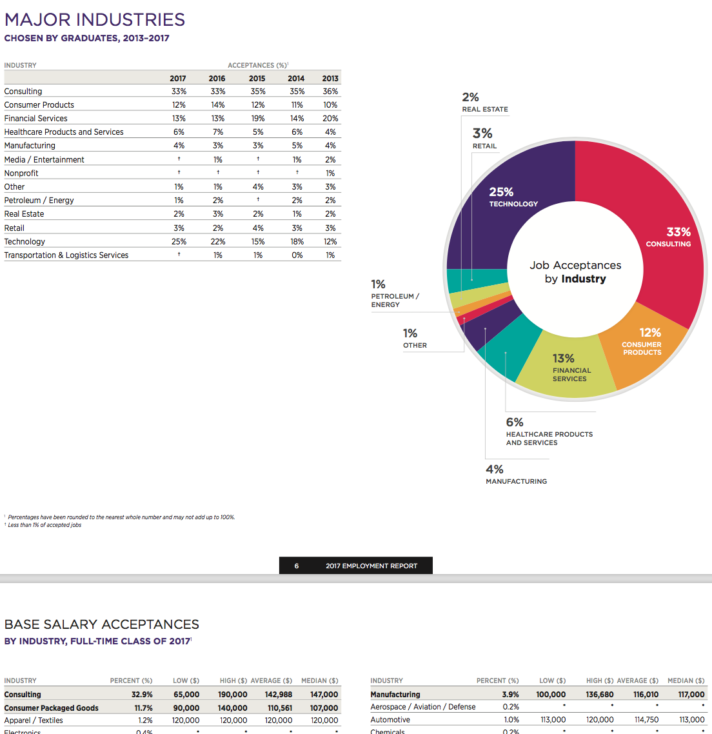
Placement is also almost identical by function, with Ross varying by function only with a higher finance placement rate---18% relative to Kelloggs 14%. Similarly, the geographical placement is remarkably comparable, with slight differences only for the international placement for Kellogg (11%) varying from that of Ross (7.5%).
Ross by Function
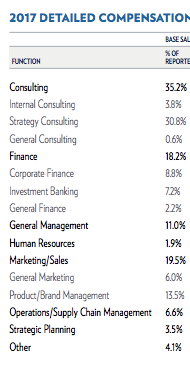
Kellogg by Function
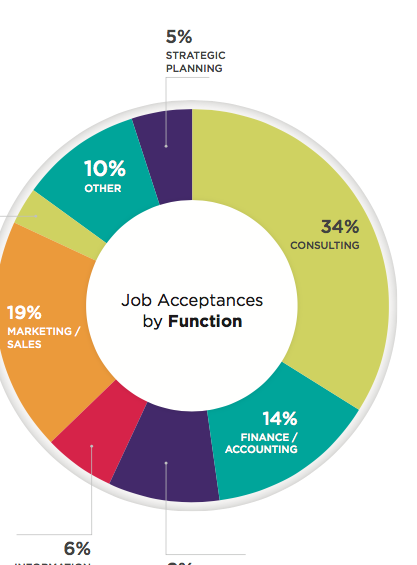
***
We hope this deep-dive comparison between the Kellogg MBA application and Ross MBA application has given you helpful intel as you make your school selection decisions this season. Finally, please leave any questions you may still have in the comment section below. Stay tuned for more Face Off posts to come!
Recent Articles
Archive
- May 2024
- April 2024
- March 2024
- February 2024
- January 2024
- December 2023
- November 2023
- October 2023
- September 2023
- July 2023
- June 2023
- May 2023
- April 2023
- March 2023
- February 2023
- January 2023
- December 2022
- November 2022
- October 2022
- September 2022
- August 2022
- July 2022
- June 2022
- May 2022
- April 2022
- March 2022
- February 2022
- January 2022
- December 2021
- November 2021
- October 2021
- September 2021
- August 2021
- July 2021
- June 2021
- May 2021
- April 2021
- March 2021
- February 2021
- January 2021
- December 2020
- November 2020
- October 2020
- September 2020
- August 2020
- July 2020
- June 2020
- May 2020
- April 2020
- March 2020
- February 2020
- January 2020
- December 2019
- November 2019
- October 2019
- September 2019
- August 2019
- July 2019
- June 2019
- May 2019
- April 2019
- March 2019
- February 2019
- January 2019
- December 2018
- November 2018
- October 2018
- September 2018
- August 2018
- July 2018
- June 2018
- May 2018
- April 2018
- March 2018
- February 2018
- January 2018
- December 2017
- November 2017
- October 2017
- September 2017
- August 2017
- July 2017
- June 2017
- May 2017
- April 2017
- March 2017
- February 2017
- January 2017
- December 2016
- November 2016
- October 2016
- September 2016
- August 2016
- July 2016
- June 2016
- May 2016
- April 2016
- March 2016
- February 2016
- January 2016
- December 2015
- November 2015
- October 2015
- September 2015
- August 2015
- July 2015
- June 2015
- May 2015
- April 2015
- March 2015
- February 2015
- January 2015
- December 2014
- November 2014
- October 2014
- September 2014
- August 2014
- July 2014
- June 2014
- May 2014
- April 2014
- March 2014
- February 2014
- January 2014
- December 2013
- November 2013
- October 2013
- September 2013
- August 2013
- July 2013
- June 2013
- May 2013
- April 2013
- March 2013
- February 2013
- January 2013
- December 2012
- November 2012
- October 2012
- September 2012
- August 2012
- July 2012
- June 2012
- May 2012
- April 2012
- March 2012
- February 2012
- January 2012
- December 2011
- November 2011
- October 2011
- September 2011
- August 2011
- July 2011
- June 2011
- May 2011
- April 2011
- March 2011
- February 2011
- January 2011
- December 2010
- November 2010
- October 2010
- September 2010
- August 2010
- July 2010
- June 2010
- May 2010
- April 2010
- March 2010
- February 2010
- January 2010
- December 2009
- November 2009
- October 2009
- September 2009
- August 2009